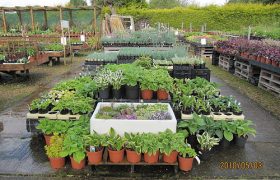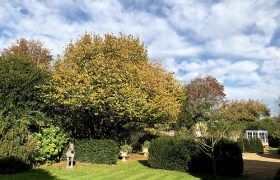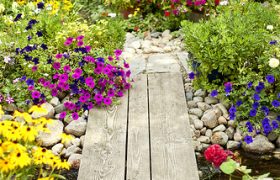There are grass varieties, such as wheat grass or catnip, that will give your feline something to nibble on besides your garden. Additionally, use your cat’s keen sense of smell to your advantage. Citrus fruit peels and mothballs both smell horrible to cats, so put them on the soil near the plants your cat likes to eat.
If the grass under your tree is turning brown, consider thinning out your tree. Grass needs plenty of sunshine, and chances are, your tree might be blocking out too much sunlight from the grass. If you trim back and thin out some branches your grass will get a little more sunshine.
Use groundcover perennials in sunny areas. Groundcover perennials can be used as an alternative to grass where there is minimal foot traffic, or in an area where grass is difficult to maintain, such as on a slope. They are also handy in between larger perennials, as they help to suppress weeds and keep the soil moist and cool. Good choices for groundcover perennials are creeping thyme, ajuga, various sedums, alyssum and armeria.
Make your own compost ahead of time rather than purchasing it. Adding compost to your garden gives your plants a needed boost to grow successfully. Begin saving your grass cuttings, raked up leaves, egg shells, and skin from fruits and vegetables in a sturdy bin 6 months prior to your gardening season. Your compost will then be ready to mix in with your dirt on planting day.
Are you having a hard time getting grass to grow in your organic garden? Will it just refuse to grow in the yard? Try looking for an appropriate ground cover to use on the exposed earth. Then you can just fill in the problem spaces and create interesting bed shapes.
Try using organic matter for your organic garden. The best organic matter that you can use for your garden’s bed preparation is a type of compost that is made from anything that used to be alive. Examples of this would be compost comprised of dead leaves, any kind of kitchen waste, or even grass clippings.
Instead of an abrasive and caustic chemical fertilizer, opt for an organic compost that breaks down substances like fallen leaves, grass clippings, loose hay, small twigs, and scraps of uneaten vegetables and fruits from your home dinner table. Allowing these elements to mingle in a compost heap will break down these individual ingredients into a nourishing organic substance with an even consistency.
Use mulch around your plants to help retain moisture and prevent the growth of weeds. You can buy mulch, but you can create your own by using grass clippings or leaves. You can even lay down plastic sheeting and plant your plants in holes in the plastic. All these methods help the plants retain the moisture they need for growth and reduce the chances that weeds will grow.





